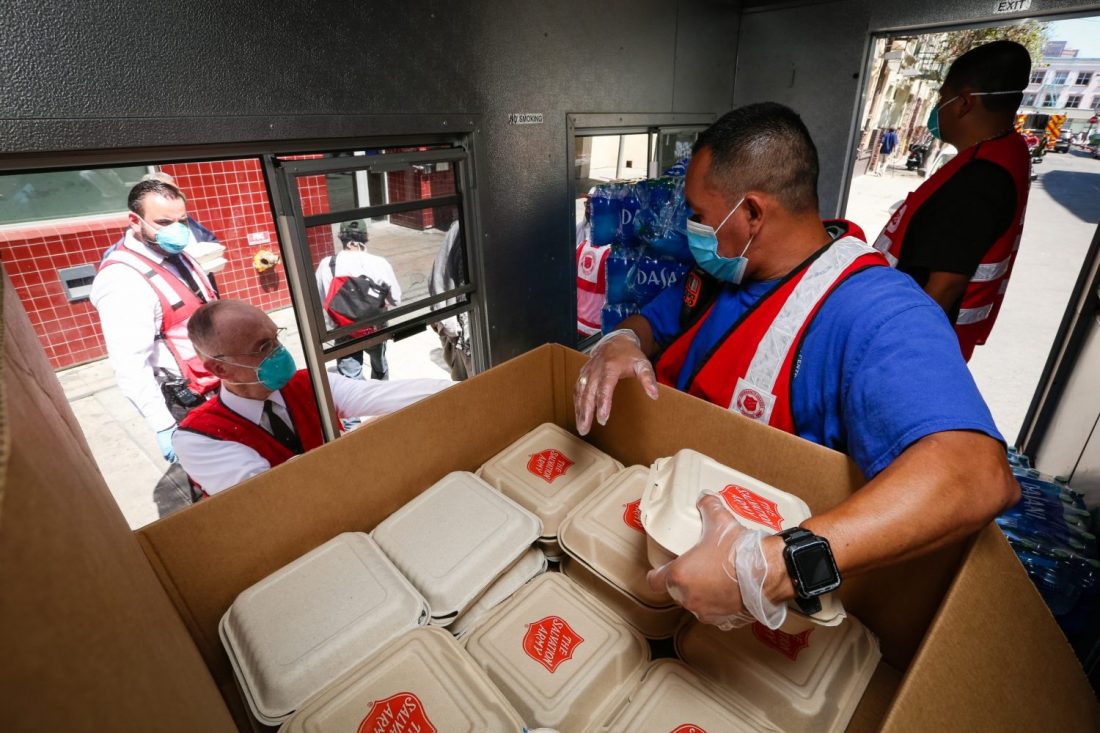France
Religious, social programs held as separate entities.
Salvationists in Montpelier, France, pray during an open air meeting. Photo by Dick Krommenhoek |
In Paris, as elsewhere in France, The Salvation Army meets practical and spiritual needs of scores of people each day.
From the City of Refuge, a men’s rehabilitation center designed in 1933 by the famed architect Le Corbusier, to the Espace Saint-Martin center, which is located in an old subway station and assists hundreds of homeless daily, to a home for unwed mothers—many of whom are Muslim—The Salvation Army offers assistance to the needy.
“The Salvation Army is the largest social institution in France,” said territorial commander Colonel Dick Krommenhoek. He notes, however, that it is known mostly as a social institution—and not as a church.
The Army’s structure in France is complex. In 2000, due to government regulations, its religious and social services aspects were separated into two identities: The Salvation Army Foundation (the social work) and the church/corps Congregation (the religious work).
Funding concerns
Currently, the Foundation is almost 100 percent government-funded; centers for social work are staffed by non-Salvationist professionals. Their programs include: rehabilitation centers, addictions, day care for the elderly, Eventide homes, and emergency programs. The territory’s 45 social centers employ 1,700 people.
Of concern to Krommenhoek is future funding for the Army’s programs. “I’m concerned that in 15 to 20 years, we will have lost many of our big institutions because of changing government policy.”
Now, he explains, the government offers the Army a sum of money to pay for the services. “I can see that in the future they will say, ‘here is the money: which of you can do this job for this amount of money?’—and we will need to compete with other organizations, which will turn it into a business…and only those who can do it cheapest will obtain the funding.”
Another cause of concern to Krommenhoek is the potential for the Army to lose its unique identity if it has to work together with other organizations to provide services.
The solution? This, he believes, lies in Salvation Army corps developing more social work programs. “We have to start developing quality corps related social work now,” he stated. “If we don’t build it now, one day we will wake up and see there is hardly any Salvation Army left.”
A practical solution
Lt. Colonel Alain Duchêne, chief secretary and president of the Foundation, voices similar concerns. “In Europe, we have to redefine what The Salvation Army is…what a corps is: is it a church or a social center? When do you preach the gospel—on Sunday morning? But what about during the week—does your life testify to the gospel then?”
The Salvation Army, he explains, is a mixture of preaching and caring. Involving soldiers in social programs holds the key to the future. “We have to have soldiers live the gospel more than preach; they need to incarnate the gospel through service to others.”
As it is, corps social programs (community programs) can receive government funding as long as the staff is non-professional, and the program is clearly identified as non-spiritual: feeding programs for the homeless, after-school programs for youth, language classes, and so on.
For Duchêne, who as a young adult met the Army on the streets of Paris in an open air meeting, the gospel is central to every aspect of Army ministry. “Secularization gives us the opportunity to redefine what we are,” he explains. “I can’t impose my religion on someone, but I can answer questions that come from my life and my actions. It gives the opportunity to say, ‘I do this in the name of the Lord and will pray for you.’ To serve takes more work than preaching on Sunday; it’s more difficult. It’s relationship, humanity.”
With challenges evaluated and resources identified, the work of the Army moves forward in France. “We’ve got brilliant soldiers and officers in The Salvation Army…the best time for the Army is yet to come,” said Krommenhoek.











